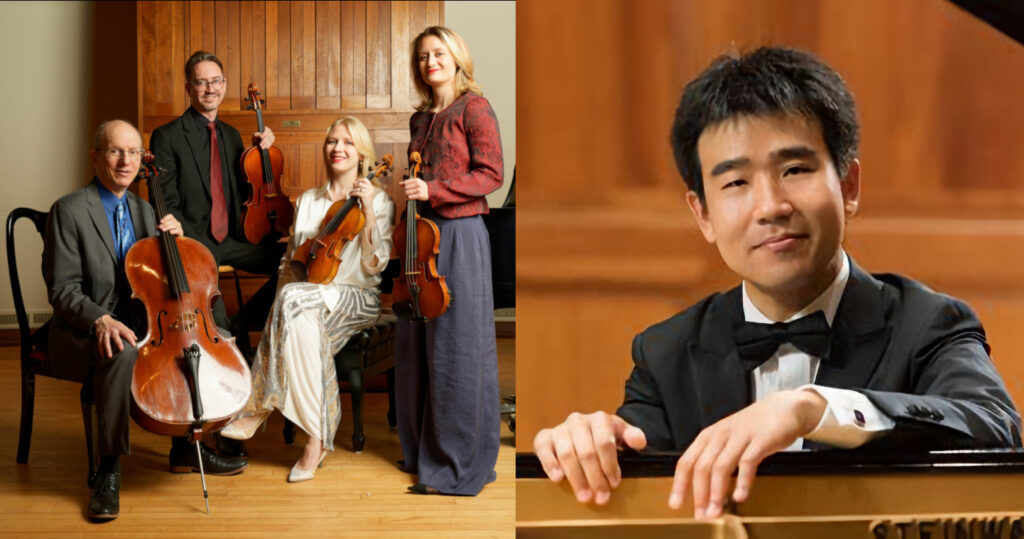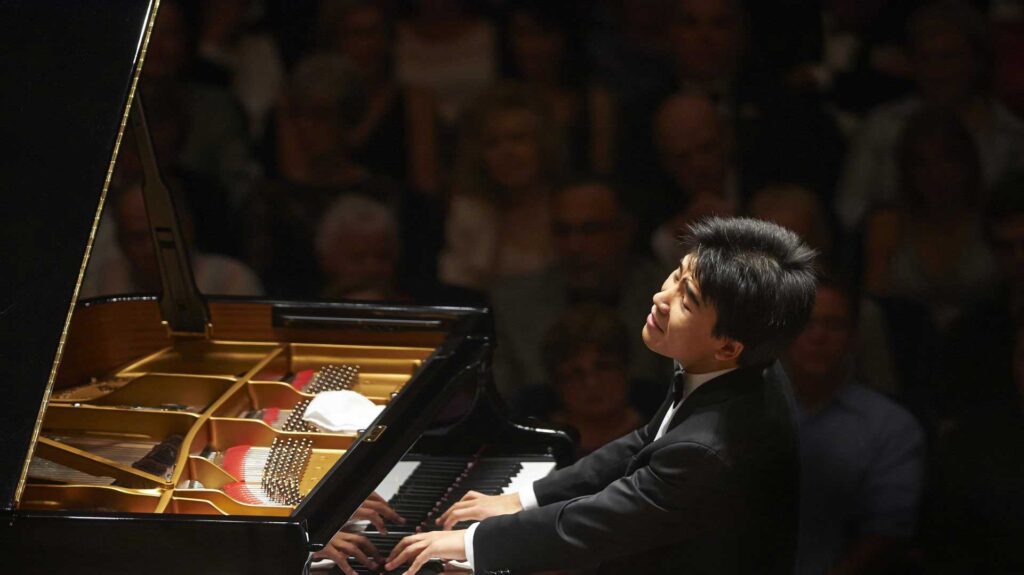Sunday, February 9, 3:00 pm. The Lydian String Quartet with pianist Jiayan Sun

“A fire that makes all timeless music forever contemporary”
Concert Program (follow link for complete playbill)
Joseph Haydn (1732-1809) String Quartet, op. 33, no. 3, in C major (“The Bird”)
Claude Debussy (1862-1918) String Quartet in G minor
César Franck (1822-1890) Piano Quintet in F minor
Clara Lyon and Julia Glenn, violins; Mark Berger, viola; Joshua Gordon, cello. Cloc
From its beginning in 1980, the Lydian String Quartet has been acclaimed by audiences and critics across the USA and abroad for embracing the full range of the string quartet repertory with curiosity, virtuosity, and dedication to the highest artistic ideals of music making. Residing at Brandeis University in Waltham, Massachusetts since the group’s founding, the Lydians offer compelling, insightful, and dramatic performances of the quartet literature. From the acknowledged masterpieces of the classical, romantic, and modern eras to new remarkable compositions written by today’s cutting-edge composers, the quartet approaches music-making with a sense of exploration and personal expression that is timeless.
The Lydians’ 29 currently available commercial recordings reflect their diverse and far-reaching repertoire, including works by Beethoven, Brahms, Ives, Ornstein, Persichetti, and Schubert as well as American contemporary composers they have long known and collaborated with such as Martin Boykan, Eric Chasalow, Peter Child, John Harbison, Lee Hyla, Steven Mackey, Kurt Rohde, Harold Shapero, and Yehudi Wyner. Their recording of John Harbison’s String Quartet No. 3 and “The Rewaking” was chosen by both The New York Times and The Boston Globe as one of the best classical recordings of 2001.
Here is what Pulitzer Prize-winning composer John Harbison (and cousin of VCC’s Board President William Harbison!) and others have said about “The Lyds,” as they are affectionately known by Greater Boston Metro area audiences:
“… Each time I encounter the Lydian Quartet my admiration for their technical, structural, and communicative power continues to grow. They are the complete package, and the wider my travels, the deeper goes my conviction.” John Harbison
“… they revealed a fire that makes all timeless music forever contemporary.”
Sunil Freeman, The Washington Post
“… full of subtlety, tonal refinement, and a sense of accumulated musical wisdom.”
Jeremy Eichler, The Boston Globe
“… splendidly performed by the Lydian String Quartet.”
Joshua Kosman, San Francisco Chronicle
Jiayan Sun has performed with the Cleveland Orchestra, the Hallé Orchestra, the Chinese and RTÉ (Ireland) National Symphony Orchestras, the Fort Worth and Toledo Symphony Orchestras, the Toronto and Aspen Concert Orchestras, and the Suwon Philharmonic Orchestra. He has conducted, from the keyboard, the Meiningen Court Orchestra. His performances have been broadcast by the BBC, the RTÉ, China Central Television and classical music radio stations in North America. Under the mentorship of Sir András Schiff, he was invited to give a number of solo recitals in Europe as part of Schiff’s Building Bridges Project.”

Jiayan Sun Interview
VCC board member and musician Andrea Bonsignore (AB) interviewed, by e-mail, Jiayan Sun (JS). The resulting back and forth is insightful and concise.
AB – How did you and the Lyds decide on the choice of repertoire? (your call? their call? a mix therein?)
JS – The Lydians proposed the Franck and I happily agreed to it.
AB – Have you collaborated with them before?
JS – No. It will be our first collaboration!
AB – What is it that you notice, observe, about the way the Lyds go about the business of tackling a large work? You play with many musicians over the course of any given season these many years, so I am curious to know if there is anything that stands out about the way the Lyds undertake the work of rehearsal, of preparation.
JS – I will find out when we start working together in the coming months.
AB – Where does chamber music fit into the activities that constitutes your professional music life? Do you focus more on (solo) recital work, your studio of students, concerto prep, accompaniment opportunities, etc? As a longtime professional woodwind player myself, the orchestra life always beckoned most strongly. But a pianist has a gigantic choice of repertoire and many different “rivulets” to pursue within the sphere of professional music work.
JS – Pianists are fortunate to have access to such a vast repertoire across centuries in solo piano works, piano concertos, and chamber music works. While I continue to devote myself to playing solo works and concertos, I have been doing much more chamber music playing in recent years with my colleagues in the Pioneer Valley and elsewhere. It is a privilege to delve into the wealth of chamber music repertoire, and playing with other musicians opens my ears and mind in ways that are otherwise impossible.
AB – And one question out of my own sheer curiosity … Who do you judge to be the best composer of piano music, both in terms of the artistic quality of the compositions and how well they work in a “pianistic” sense. I will admit to my own enormous preference for the piano sonatas of Beethoven, but I want to know how your own tastes and lifetime of work has shaped your preferences, even your obsessions.
JS – This is a tricky question… As Charles Rosen pointed out, an “easy” passage in Chopin would sometimes be followed by a similar passage that is quite “unpianistic”, i.e. doesn’t fit the hand. I come to realize that a good composer would devise their piano writing in a way that best conveys their musical ideas. Thus Beethoven sonatas and Chopin preludes are both “pianistic” in their own way.
Links to the Lydian String Quartet Artist Information Pages
Ravel, from the Lydian Quartet:
https://youtu.be/CJW7qyH0L6M